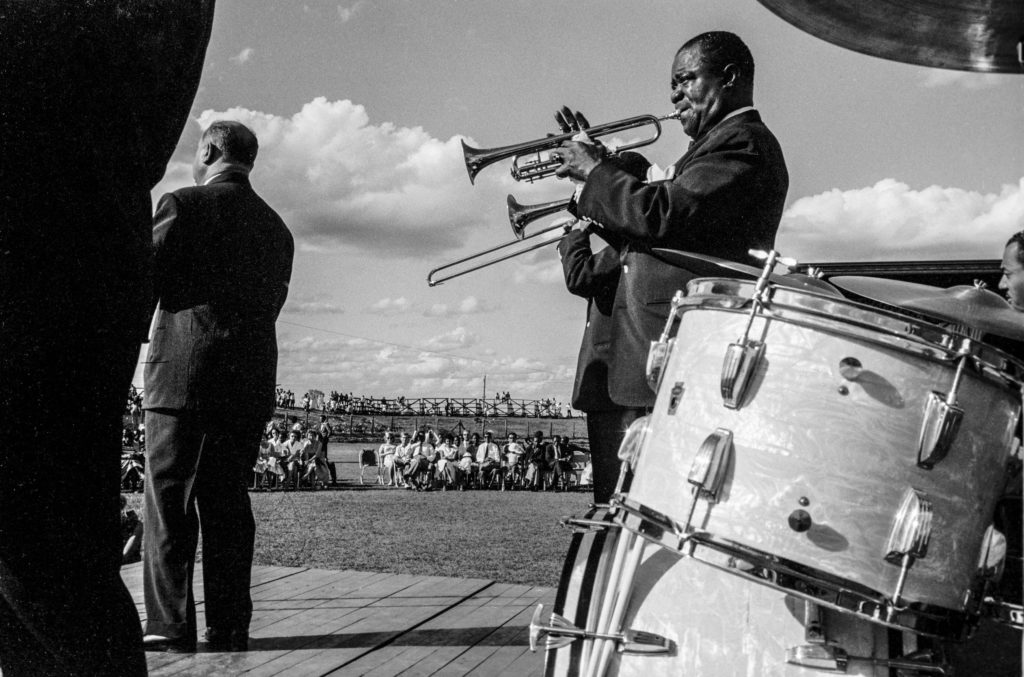Gregory Isaacs performing at Reggae Sunsplash festival in Jamaica. (David Corio/Redferns)
Louis Armstrong, Zimbabwe tour, 1960
 American jazz musician Louis Armstrong (1901 – 1971) and his All-Star Band performs at an outdoor venue during a tour of Africa, late 1960. (Susuan Wood/Getty Images)
American jazz musician Louis Armstrong (1901 – 1971) and his All-Star Band performs at an outdoor venue during a tour of Africa, late 1960. (Susuan Wood/Getty Images)
Speaking to Al-Jazeera, Gibson Mandishona said that Satchmo’s visit to Zimbabwe in 1960 “awakened many people [and] … revived jazz in the sense that people began to look at the history of jazz in this country. And also there was a big influence of black Western music into Zimbabwe during that time.”
For August Musarurwa and Louis Armstrong, the visit marked a pivotal chapter in a trans-Atlantic dialogue signified by Armstrong’s 1954 recording of Musarurwa’s hit Skokiane, which he first laid down with the African Dance Band of the Cold Storage Commission in Southern Rhodesia in 1947.
Percy Sledge, Bulawayo, 1972
In the book, Is it Nation Time? contemporary Essays on Black Power and Black Nationalism (edited by Eddie S Glaude), Gerald Horne writes of Sledge’s visit to Rhodesia: “The liberation forces felt he did not show his ‘love’ for their nation when he toured Bulawayo in 1972. Sledge was puzzled as to why the concert promoters were seeking to keep him away from Africans. ‘I don’t know why they are hiding me. I want to see my people,’ he said, referring to Africans, not the minority population.
“Born in Alabama in 1942, Sledge confessed that he had not broken the ‘cultural boycott’ of Rhodesia because of his desperation for money. ‘I have been a multimillionaire,’ he said with pride. In any event, Sledge did manage to make contact with the Africans during his stay; while a reporter was interviewing him, his telephone kept ringing with — apparently — fans of his on the line.”
Gregory Isaacs, Harare, 1987
I first became acquainted with Gregory Isaacs when he came to Zimbabwe in 1987, after an invitation to perform from a local music promoter, Musekiwa Nkumbula.
I and the late Tendai Gamure, aka Culture T, went to visit him at the Holiday Inn in Harare.
After we introduced ourselves to him, he asked us where he could get some cocaine. Although I had never heard of anyone trading in coke in this country, Tendai seemed to have an idea, “Give me 50 bucks and I will go and get you some,” he said.
In no time at all, Culture T was back with some white powder wrapped in a brown paper. Gregory sniffed it and tasted some with his tongue and he quickly retorted: “No man, dis cyan be coke. Dis raas******************** man tief my 50 pound fram mi, raatid, Bomba******************** Jackass!”
Before Gregory was done with his Jamaican expletives, Culture T was gone. We later learned that it was powdered milk Tendai had brought. Gregory got so depressed that Nkumbula tried to persuade him to go on stage without his fix, but this was his response: “You cayn sing for dem audience without feeling high. It’s too draining man! Go on play dem a disco. Play dem some of my tunes, man!”
He later agreed to go on stage, but because he was so depressed, he only sang three songs and left the stage. The 60000 fans in the stadium were not amused. A riot followed and the police came in with teargas. That was the end of the Gregory Isaacs tour of Zimbabwe.
(Source: Fred Zindi, “Special tribute to the cool ruler” in the Zimbabwe Herald)
Shabba Ranks, Rufaro Stadium, Harare, 1993
The masses waited about seven hours to see dancehall’s finest. When he arrived, close to midnight, poor sound and visibility raised the ire of an already irate crowd. Police clashed with crowds outside wanting to go in. The teargas, in scenes reminiscent of Bob Marley’s Independence Day concert, drifted inside forcing Shabba to flee the stage. From there, the scene descended into a fully-fledged riot. So deplorable was the mayhem that the promoter was reportedly banned from staging events. (Sourced from AP)
Thomas Mapfumo, Boka Tobacco Auction Floors, Harare, December 2000
Thomas Mapfumo’s December 2000 show at Boka Tobacco Auction Floors in Harare — then reportedly the biggest tobacco auction floors in the world — was a homecoming of sorts for the Chimurenga maestro. He had been in the United States, where he was setting up base for his eventual exile. The show, attended by thousands of his fans who packed the vast venue, ended at daybreak, a pungwe in the parlance. Some of those who were there confess it to be the best-ever show by the musician they have been to; some say his rendition of the dirge Moyo Wangu (literally: “my heart is sore”) had the cadences of a man who seemed to know that he was to be exiled from Zimbabwe for close to two decades.